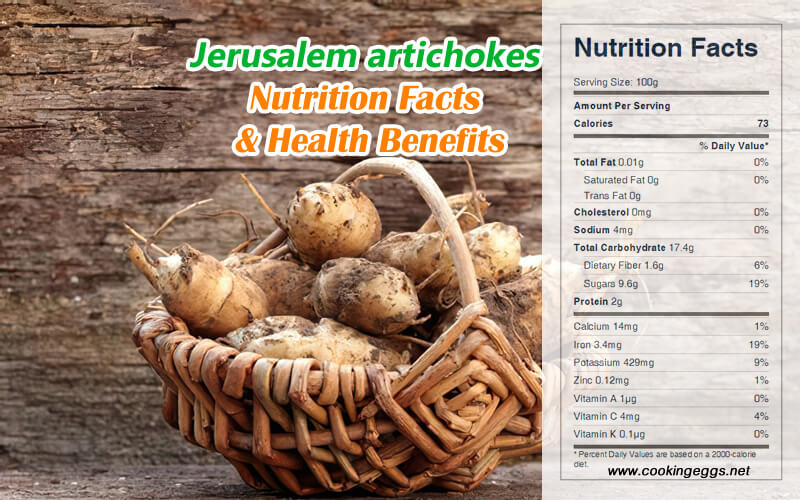Jerusalem artichokes Nutrition Facts & Health Benefits
Jerusalem artichokes belong to the sunflower family native to central North America. Jerusalem artichoke is nature’s prebiotic. Its tubers are an important source of inulin, used as a dietary fiber in food manufacturing.
Nutritional value of Jerusalem artichokes
Raw Jerusalem artichoke is 78% water, 17% carbohydrates, 2% protein, and contains negligible fat. It is a good source of vitamin B1, fiber, and iron, and it also provides some phosphorus.
In a 100-gram reference amount, raw Jerusalem-artichokes supply 73 calories of food energy and are a rich source of iron (19% of the Daily Value), a moderate source of vitamin B1 (17% of the Daily Value), and contain other B vitamins.
One cup of raw sliced Jerusalem artichokes (150 g) provides 110 calories, 26 g carbohydrate, and 3 g protein. 0.01 g fat, 2.4 g dietary fiber, 30 IU vitamin A, 6 mg vitamin C, 19.5 mcg folate, 644 mg potassium, 6 mg sodium, 5 mg iron, 21 mg calcium, 117 mg phosphorus, and 25 mg magnesium.

Raw Jerusalem artichokes Nutrition Facts Label
Health Benefits of Jerusalem artichokes
Jerusalem artichokes are extremely low in calories, very low in fat, cholesterol, and sodium. They contain hardly any salt but are a rich source of heart-friendly potassium. Potassium has a major role in the maintenance of fluid and electrolyte balance. As part of the diet, Jerusalem artichokes are excellent for sufferers of diabetes, heart disease, and hypertension.
Although Jerusalem artichokes are rich in carbohydrates, there is little sugar in them since they contain inulin, which the body deals with in the same way as fiber. The inulin from the roots can be converted into fructose, a sweet substance that is safe for diabetics to use.
Inulin isn’t broken down during normal digestion but ends up in the colon, where it provides food for billions of friendly probiotic bacteria. As with globe artichokes, the resulting fermentation can sometimes be a cause of gas, but that’s a small price to pay for the fabulous taste and the low glycemic index benefits of this much-underrated vegetable. Jerusalem artichokes are ideal for diabetics and anyone who has problems keeping their blood sugar levels stable, and the inulin is not absorbed by the body.
Jerusalem artichokes contain high amounts of inulin as well as a variety of insoluble fibers and caffeoylquinic acid. The combination of these phytochemicals and nutrients has an extremely powerful effect on the gut. Studies have shown this combination increases short-chain fatty acids (SCFAs), leading to positive and dynamic changes in the composition and variety of the gut microflora. SCFAs are produced as a result of breaking down resistant starches and dietary fibers. We need these in our gut because they decrease the pH, making it more acidic, which doesn’t allow the bad bacteria to survive and also plays a positive role in regulating metabolism and our immune system.
A study found that the consumption of Jerusalem artichokes had a positive effect on the gut microbiota by increasing concentrations of SCFAs and decreasing the pH in the intestines. In addition, when compared to inulin extract alone, Jerusalem artichoke was found to modulate the microbiota and more positively affect the bacterial population in the gut. This is likely due to other bioactive compounds found in the vegetable.
They are also a good source of iron. It is necessary for the body, and iron levels in the body are a critically important part of many aspects of human health and disease. Iron is essential for red blood cells, where most of the human body's iron is contained.
Health Risk
Inulin cannot be broken down by the human digestive system, but it is metabolized by bacteria in the colon. This can cause flatulence and, in some cases, gastric pain.